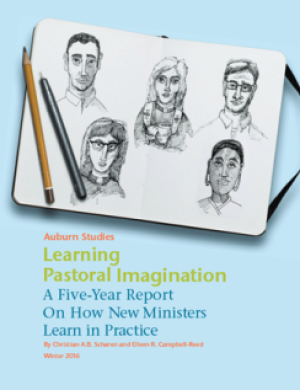Resources
One page Teaching Tactic: a warm-up exercise requiring students to recall and synthesize course material by selecting what is applicable to a practical pastoral care setting that they might reasonably expect to encounter.

Click Here for Book Review Abstract: Preparing a learning portfolio has become a mandatory part of the course work in most clinical professions. Students and educators alike sometimes complain that these mandatory assignments become repetitive and uninspired. However, we all need to be able to speak and write clearly as we work with our colleagues, students and those we care for. In Portfolio To Go, Allan D. Peterkin insists that reflective capacity, critical thinking, creative expression, and narrative competence are attributes that should be developed in every health professional – regardless of the discipline or specialty. Trainees will find over 1000 prompts organized under themes highly relevant to students and educators, including those not formally addressed in class, such as coping with uncertainty and ambiguity, team conflict, and resilience through good self-care. Practical tips for writing effectively and for discussing and evaluating narratives in a helpful, respective manner are provided throughout. Peterkin is a pioneer in emphasizing patient-centred, humanistic care and Portfolio To Go will help to train and develop more reflective practitioners. (From the Publisher)

To lead with courage and pastoral wisdom in the twenty-first century requires ministers to make a transition from simply imagining ministry to embodying pastoral imagination. The relational and embodied capacity for ministry, what Craig Dykstra first called pastoral imagination, emerges over time and remains indispensable for effective pastoral leadership in congregations and community ministries. We find through listening to ministry leaders across the country that ministry today is less about exercising the authority of an office or role and more about embodying an authentic contextual wisdom only gained by daily practice of leadership on the long arc of learning ministry. Yet few studies of learning over time have been conducted, leading to this unique, broadly ecumenical, and national study of learning ministry in practice. In this five-year report, we describe the experiences of a cohort of 50 diverse ministers from across the United States, recruited from 10 theological schools ranging from Pentecostal to Eastern Orthodox and coming from many different denominational traditions. This study deepens engagement of Auburn research on patterns of teaching and learning in theological education, offering a dynamic view into the formation of faith leaders for the twenty-first century. (From the Publisher)
This article emerges from the experience of incorporating doctoral students into our Contextual Education (CXE) Program at Emmanuel College (Toronto). This change, I argue, helped us to distinguish more clearly among and thus distinctly orient the different kinds of relationships and theological practices that make up our program towards the often-elusive goal of curricular integration. After outlining a definition of integration, I contextualize that definition in our particular practices at Emmanuel College using Kathryn Tanner's (1997) understanding of theology as a cultural practice as my guide. I then offer a brief overview of our CXE Programs to demonstrate how nurturing strategic partnerships within them has made certain forms of integration possible for our students. I close with some activities for practical application in other CXE contexts.

Click Here for Book Review Abstract: The unfortunate reputation of online education today is one of little or no effort on the professor's part and little or no learning on the student's part. A missing element in much online education is the kind of mutual engagement between student and instructor that provides not only a higher level of learning but also lasting character formation within the student. Character Formation in Online Education stems from author Joanne Jung's years of experience teaching online courses with the aim of improving the teaching environment for professors and the learning environment for students. By replicating, customizing, and incorporating the best and most effective practices of what a great professor does in on-campus classes, reimagined for an online delivery system, Jung shows how a higher level of learning and transformation can be achieved through online learning communities. Handy and practical, this user-friendly book provides guidance, helpful tools, and effective suggestions for growing learning communities in online courses that are marked by character growth in students—the kind of growth that is central to the mission of Christian higher education. (From the Publisher)
When five theological schools realized (a) their graduates affirmed vocation as central to their theology and practice, yet (b) the parishioners of their graduates nevertheless did not feel called, they knew they had to do something. For six years, faculty teams from these schools conducted a variety of experiments in pedagogy, curriculum reform, and program development in order to train their graduates to equip all of God's people to claim and live their vocational identity in the world. This article introduces the identified challenge and necessary theological and pedagogical shift and then describes five of those experiments in greater detail.

Journal Issue. Full text is available online.

Journal Issue. Full text is available online.
Field Education supervisors from 6 schools report on different learning community opportunities they facilitated among a selected group of supervisors, regarding each as a “community of practice.”
See the responses by Nancy Fuchs Kreimer, Yael Shy, and Yehuda Sarna directly following in the table of contents linked here. Rabbinical students gain important knowledge and become more reflective teachers by learning about other religions and with people who practice them. They can also learn how to help educate non-Jews about Judaism and serve as representatives of, and advocates for, our community.